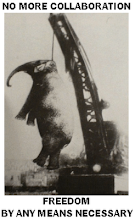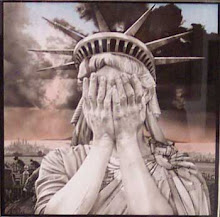By Aetius Romulous
06 January, 2010
Countercurrents.org
A tiny part of a tiny part of the population of the earth will set the terms for the future of all humans. A tiny part that is broken, spent out, and increasingly disillusioned. That sliver of humanity is the broken, spent out, and increasingly disillusioned American middle class, burdened with the task of spending all America out of catastrophe. When they break under the weight of desperate impossibility, how will the heartlands good citizens react, and what will they do?
According to the World Bank, there are 6,692,030,277 human beings on the earth. 308,108,741 of them live in the United States, about 4.6% of the total. Of these fortunate Americans, about 231,000,000 are of voting age. In general elections in history's greatest democracy, about half those eligible to vote actually do...115 million people. History's greatest democracy has only two options every election, a choice between two almost similar positions, and the winning option typically enjoys the support of only half of those who choose, approximately 60 million individuals.
For a scant 90 years, America has been the wealthiest, most powerful group of humans in all 20,000 years of recorded civilization. Decisions made by Americans can and do affect the lives of every other human on the planet, often for both present and future, good and bad. By brute force of American economics alone, a single, small 0.9% of the 6.6 billion people who call earth home set the agenda for each and every one of all the rest of us. Not even by force of arms has there ever been a time in glorious history when so few people dominated so many in so complete a way.
Centuries from now, historians will want to know whom these few people were, if only to understand how they lived and thought, and better know the cause of global events that shaped the world they live in. As we in our time grapple to understand who the powers were that made a Roman, a Roman, future thinkers will want to dissect the condition of the less than one per cent of all humanity who call themselves American, and who alone make America, America... and the earth, American as well.
It cost 1 billion dollars and four years to have .9% of the earth elect the President of the United States in 2008. It took a similar amount of time and money to be the guy that lost. Hundreds of millions more are expended to elect the 435 people who make up the United States Congress. No statistical analysis is required to understand that these are among the wealthiest and most privileged humans in all of history. A tiny fraction of a tiny fraction of a tiny fraction of the population of the planet. This, we are led to believe is democracy, and so this small sliver is at least nominally responsible to those few who elected them, and nobody else.
Like all great empires, America has a well-defined class structure. As a fedora on a table, at one brim is the thin cruel line of poverty and disenfranchisement, at the other brim another thin line of luxury and excess, and a middle where the head goes which has historically been the big, fat, American middle class. The middle class sets the agenda by dearth of weight, the luxury class promoting the agenda where and when it suits them. The lower class don't matter at all.
The great American middle class, then, at least nominally controls the fate of the planet. They do so by electing wealthy folks who pander to their interests, those wealthy folks whose interpretations of the middle class becomes policy. Future folks will want to understand how representative those interpretations were, and will want to see if changes in the middle class over time were responsible for changes in American policy towards the world.
If anything defines the great American middle class, it is the concept of the American Dream. The basic building block of the American Dream is the family - mom, dad, 2.4 kids and a dog. The "dream" part is the very American right to economic freedom, freedom to accumulate stuff. A box on a postage stamp in a sea of urban sprawl called home, a couple of cars, a good education for the kids, and unrestricted ability to consume as much surplus crap as possible. Americans define success completely in economic terms and then attach the flag, religion, and everything else to it. Without this absolute right to consume hordes of junk, there is no American Dream, and no middle class. There is left only a lower class, (whatever that is), and a powerful capitalist class existing as it always has throughout time, changing flags and philosophy depending on how the winds blow. Caesar, Czar, King, or CEO of Goldman Sachs.
The rise of the middle class at the end of the 19th century tracks the rise of wealth and power for most western, industrialized nations. Production, trade, and consumption of machine made goods became a near universal indicator of the rise of modern civilization. However, 40 years of crushing war amongst European powers stalled the growth for most, but emerging America remained unscathed, benefiting from the misdemeanours of a now dead age. History will fix the date of the birth of absolute America to the year 1914, the dawn of the American age to 1945, and no doubt, the golden era to the short period that began to erode in 1971. Of the time since, we the generation here and now and in the teeth of it, can only speculate.
In the summer of 1914, America was an outlier in a world of teetering monarchies, festering colonial empires, and rancid landed aristocracies. While the rest of the world fed its gold and its young to the insatiable maw of industrial war, Americans were building a dream from limitless resources and the economic opportunities of a conflict that left America unspoiled and prosperous. By the close of hostilities in 1945, with the capital of the planet spent and exhausted, America burst from the ruins to begin the greatest run of prosperity and innovation of all time. The American middle class exploded, living the dream so thoughtfully given to them over a generation of global war.
Powerhouse America imposed its vision of a liberal, free market democracy on the "free world" through the Bretton Woods agreement of 1944. The United States became the world's greatest manufacturer of goods, trader of goods, and consumer of goods. Rebuilding the planet became a God given mission, the profits manna from heaven. The American dollar became the world's dollar. Freedom and cash registers rang.
But with the US greenback backed by gold, American economic expansion was limited to the bullion it horded. Wars in Korea and Viet Nam, and the massive expansion of "entitlements" with Social Security and Medicare among others, began to strain the American Dream. By the early 1970's the US had ceased to be an exporter of stuff, and the middle class began to buy increasingly cheaper stuff from abroad - at the expense of their own manufacturing and jobs. Given that the dream of freewheeling consumption was the bedrock of the burgeoning, voting middle class, politics insisted on a populist solution to the increasingly broke US economy. In 1971, Richard Nixon elected to abandon Bretton Woods, leave the gold standard, and America was free to print its way out of deficit and keep the dream alive.
At the same time as the US set the world awash in USD's, untold wealth and prosperity inflated its way through the massive baby boomer cohort. Women were entering the workforce in exponential numbers, soaking up inflated dollars with double incomes - and less expensive kids. American politics became a contest of pandering to the hedonistic desires of the American household, boom times embraced and fuelled by lax regulation and credit, busts fought off with the simple printing of even more money. Good times.
The American household saved 11% of its income in 1970, and had only 1.4% of its cash going to newfangled credit cards and auto loans. Everything else exchanged for clothes, appliances, food, houses, and shiny happy stuff, increasingly from overseas. Unknown to all, it was to be the high water mark for the middle class of America.
In 1971, American imports exceeded exports for the first time in modern history, by 2.6 billion dollars. At a time when a billion was a lot, America began paying to simply exist. Gross Public Debt had grown from 43 billion in 1940, to 381 billion by 1970. Within a single generation - the age of narcissism, the computer age, the age of globalization - the baby boomers of the American middle class had tilted the entire planets resources towards an unsustainable consumer culture. No longer living the dream, those alive just moments before Lehman Brothers listed over, rolled under, and disappeared below the waves of history, were fighting simply to keep the stuff they had.
The future had evaporated right before their shuttered eyes, and for over forty years.
The current version of the American middle class bears no resemblance at all to that of the end of the golden era in 1970. Forty years ago, Americans saved 11% of their earnings - which had evaporated by 2005, reaching the oxymoron of negative savings. Credit card debt shot from 1.4% to 15%. In the space of a generation, a single income family flush with cash, savings, and dreams had become a double income nightmare staggered with debt.
In 2008, there were more household bankruptcies than divorces.
The cost of crap fell and Wal Mart rose. Debt enslaved suburbanites now spend 32% less on clothing than they did a generation ago. 18% less on food, 52% less on appliances, and 24% less on cars. The middle class is consuming as voraciously as it ever has, however they have replaced sturdy $400.00 American Lawn Boy lawn mowers with $99.00 tin cans from China, and buy them now on credit. Some call that progress, others, value. In reality, it's inflation. The simple fact of the matter is Americans no longer have the disposable income to consume their way out of trouble, and that trouble lies in why it is the American middle class is broke, struggling, and increasingly angry.
At the same time that consumables were falling in price, the fixed portions of the American Dream began an exponential increase. Two incomes meant two cars - or three, or four - and despite the fact that cars were cheaper, the cost of cars to the two-income family rose by 52%. Houses got bigger, and mortgages increased 76% - with 10 million of them in various states of distress and foreclosure. Health insurance rose 76%, taxes 25%. Childcare was an expense nobody had a generation ago, but one that became essential with two adults working. The cost of education had increased - as did the length of time necessary to obtain that education. A ticket to the middle class that cost 12 years of school - grade one through high school - now includes daycare, preschool, grade school, high school, and then college. Americans must now pay for the additional time.
In 2005, that .09% of the earth that set the agenda for the planet was spending over 66% of its income on the fixed costs of the American dream alone, where it once spent less than a third. Or, to frame it in a way that defines the great problem, the American system that depends on rabid consumerism has left its heartland with exponentially decreasing amounts of disposable income, falling from 66% to 33% in a single lifetime. When George W Bush implored the middle class to spend its way out of the 9/11 chaos, in stunned and terrified whispers the American middle class muttered, "With what?"
"The conscious and intelligent manipulation of the organized habits and opinions of the masses is an important element in democratic society. Those who manipulate this unseen mechanism of society constitute an invisible government which is the true ruling power of our country"- Edward Bernays, 1928
"Our enormously productive economy...demands that we make consumption our way of life, that we convert the buying and use of goods into rituals, that we seek our spiritual satisfaction, our ego satisfaction, in consumption.... We need things consumed, burned up, replaced and discarded at an ever-accelerating rate"- Victor Lebeau, 1947
"Too much consumption and too little investment, too many imports and too few exports. We have not been on a sustainable economic track and that has to be changed. But those changes don't come overnight, they don't come in a quarter, they don't come in a year. You can begin them but that is a process that takes time. If we don't make that adjustment and if we again pump up consumption, we will just walk into another crisis."- Paul Volker, 2009
“If you look around, you see how many people is out of work, number one, and you see how many people is in foreclosure or lost their homes or in default because they've lost their jobs, that tells you right there what the economy is doing.” - Middle Class American, 2009
A tiny part of a tiny part of the population of the earth had constructed a global economic architecture that sustained it in wealth and excess, security and predictability. In a scant forty years that wealth, excess, security, and predictability have proved to be entirely unsustainable. The approaching political climate of the American middle class will reflect the shock and desperation that may now be starting to manifest itself. How Americans react to their fast changing circumstance and what they will do about it will deeply affect the 95% of the earth's humans who are really only along for the ride.
In 2008, America gambled on hope, as hope is all it had. A new administration faced the growing catastrophe in the only way it could understand, frantically pumping in dollars to resuscitate a prostrate consumerism. An insane amount of debt piled up, the annual deficit soaring through $1,000,000,000.00. One trillion dollars. Absolutely none of it was used to purchase plasma TV's, hot tubs, or bling. The richest of Americans - as they always have - prospered along Wall Street and summered in the Hamptons while the drought stricken middle class waited for a rain that will never fall.
The American middle class will not spend its way out of disaster, if only because it can't. There are no savings. The house is worthless. The credit cards are gone. Jobs are disappearing. Today is bad and tomorrow looks worse. People are nervous, frightened, worried. They are behind in the mortgage, and struggle to make health insurance payments. All the while, they watch the stock market explode, the bonuses arrogantly roll on, and their government lie to their faces that the "recovery" is underway. China is booming, so is India and Brazil. Beneath the hope, patriotism, and the flag, the American middle class can feel it all slipping away.
In a nation consumed by politics, where pandering and lobbying are two sides of the same platitude, what will the increasingly angry gentle folks of Ohio, Iowa, and Florida demand of their philandering representatives in Washington? What form of instant remedy will some baseless political hack come to offer them as the snake oil for what ails them? How will those decisions come to dominate the lives of those in Canada, Ecuador, and Ghana?
In the distant future, historians will consider the rise, fall, and collapse of the great American Dream and conclude that was the cause of all that followed. None will be surprised at the all too human response of anger, frustration, and action in the teeth of injustice and inequality. After all, history is full of angry people who just weren't going to take it anymore. They will wonder only how it was we could not see it coming - how we could be so stupid to have blown it.
The coming fury of angry America is as palpable as it is silent. What will that tiny part of a tiny part of the earth's population do when the utter hopelessness of the situation washes over them and the tides of history curl around and bear them, inexorably, into the past?
What will they do?
Aetius Romulous Historian, Economist, Accountant, Writer, and blood sucking CEO. Born at the wrong end of the Baby Boom Generation - too late to enjoy the ride, too early to have missed it, and stuck in the middle with the mess. Aetius writes and blogs from his frozen perch atop the earth in Canada, spending the useful capital of a life not finished making sandwiches and fomenting revolution. It's a living.
http://screambucket.com/
aetiusromulous@rogers.com
Sunday
Subscribe to:
Post Comments (Atom)

![[Most Recent Quotes from www.kitco.com]](http://www.kitconet.com/charts/metals/gold/t24_au_en_usoz_2.gif)




























1 comment:
I belive that 3% of one of those statistics will have a big say in the outcome of the near future.
Post a Comment